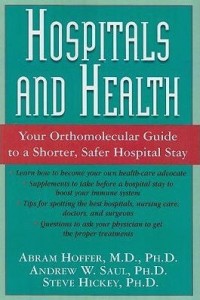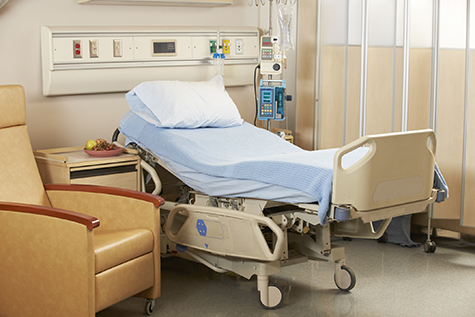Doctors Offer Guide to Shorter, Safer Hospital Stay

LOS ANGELES, Calif (December 28, 2017) — Most people, over the course of their lives, are likely to spend time in a hospital. What many may not realize is that the risks of a hospital stay might outweigh the benefits. Sometimes hospitalization is essential—for trauma, life-threatening emergencies, or complex surgical procedures. But despite the benefits of modern medicine, hospitals can be dangerous places. Each year, hospitals harm thousands of patients, and many more suffer serious or fatal drug side effects. Learn how to protect yourself!
 Hospitals and Health: Your Orthomolecular Guide to a Shorter, Safer Hospital Stay by Abram Hoffer, M.D., PH.D., Andrew W. Saul, PH.D., and Steve Hickey, PH.D., looks at how hospital care got on the wrong track, from historical and economic perspectives. It then offers suggestions for minimizing the risks of a hospital stay and ways to improve your own experience. Good nutrition is the key—to boost your immune system, speed recovery from illness, and reduce your need for pharmaceuticals. And you’ll learn how to become your own healthcare advocate. The book provides tips for choosing the best hospitals, nursing care, doctors, and surgeons. You’ll be armed with the knowledge you need to demand the best care possible.
Hospitals and Health: Your Orthomolecular Guide to a Shorter, Safer Hospital Stay by Abram Hoffer, M.D., PH.D., Andrew W. Saul, PH.D., and Steve Hickey, PH.D., looks at how hospital care got on the wrong track, from historical and economic perspectives. It then offers suggestions for minimizing the risks of a hospital stay and ways to improve your own experience. Good nutrition is the key—to boost your immune system, speed recovery from illness, and reduce your need for pharmaceuticals. And you’ll learn how to become your own healthcare advocate. The book provides tips for choosing the best hospitals, nursing care, doctors, and surgeons. You’ll be armed with the knowledge you need to demand the best care possible.
If you are in the hospital for four days, you can expect four medical errors in that time. In fact, according to Dr. Saul, hospitals are so dangerous now that you see signs in the hallway and in patient rooms reminding staff to wash their hands.
In the book, the authors explain the history of what hospitals were and what they have become: a business. If the hospital beds are empty, the hospital loses revenue — just as the doctor who has successfully treated his/her patients is now left with fewer patients can feel the effects in their wallet. So, are the doctors and hospitals not doing their best to help us get and stay well?
The book covers the following topics:
-Corporate Medicine and the Profit Motive. Sickness=Profits
-A Look at Hospital-Acquired Infections. The sickest people in the closest proximity.
-Psychiatry and the Limits of Modern Medicine. Psychiatric drugs and the abuse of power.
-Take Charge of Your Health Care. Accurate methods of diagnosis
-The Power of Nutrition. Vitamins and supplements you should bring with you to the hospital.
 Individuals need to accept responsibility for their own health, beginning with good nutrition. By asserting control of health decisions, you can steer clear of unnecessary risks and, if hospital treatment is unavoidable, increase the chances of success. Take charge of your health care with Hospitals and Health.
Individuals need to accept responsibility for their own health, beginning with good nutrition. By asserting control of health decisions, you can steer clear of unnecessary risks and, if hospital treatment is unavoidable, increase the chances of success. Take charge of your health care with Hospitals and Health.
If you find yourself in the hospital, here are some tips from the book:
- Good nutrition is essential, but hospital food is typically associated with bad food – packaged, processed and overcooked. At many hospitals if you ask, you can get better food. Ask for a vegetarian diet. You can also do a little research to find out which hospitals in your area have the best food.
- Hospitals don’t give people vitamins even though they should. Ask your doctor to write you a note saying that it is okay for you to take your vitamins during your stay.
- Bring a friend or relative who can advocate for you if needed, but who will also be a guard. Make absolutely sure that someone Is with you or the patient 24-hours a day while in the hospital.
- Avoid any elective surgery or hospital stays in June and July when staff training is over, or on weekends. Weekends are the time when the second string staff is on duty. Weekends are also the time when most of the deaths happen.
- Know that the most powerful person in the hospital is the patient (or his relative if the patient is not conscious). Know your rights as a patient and assert them. When you are admitted to a hospital, you sign papers giving them permission to do one thing. It does not mean they have permission to do everything. You can put a stop to anything if you need to.

